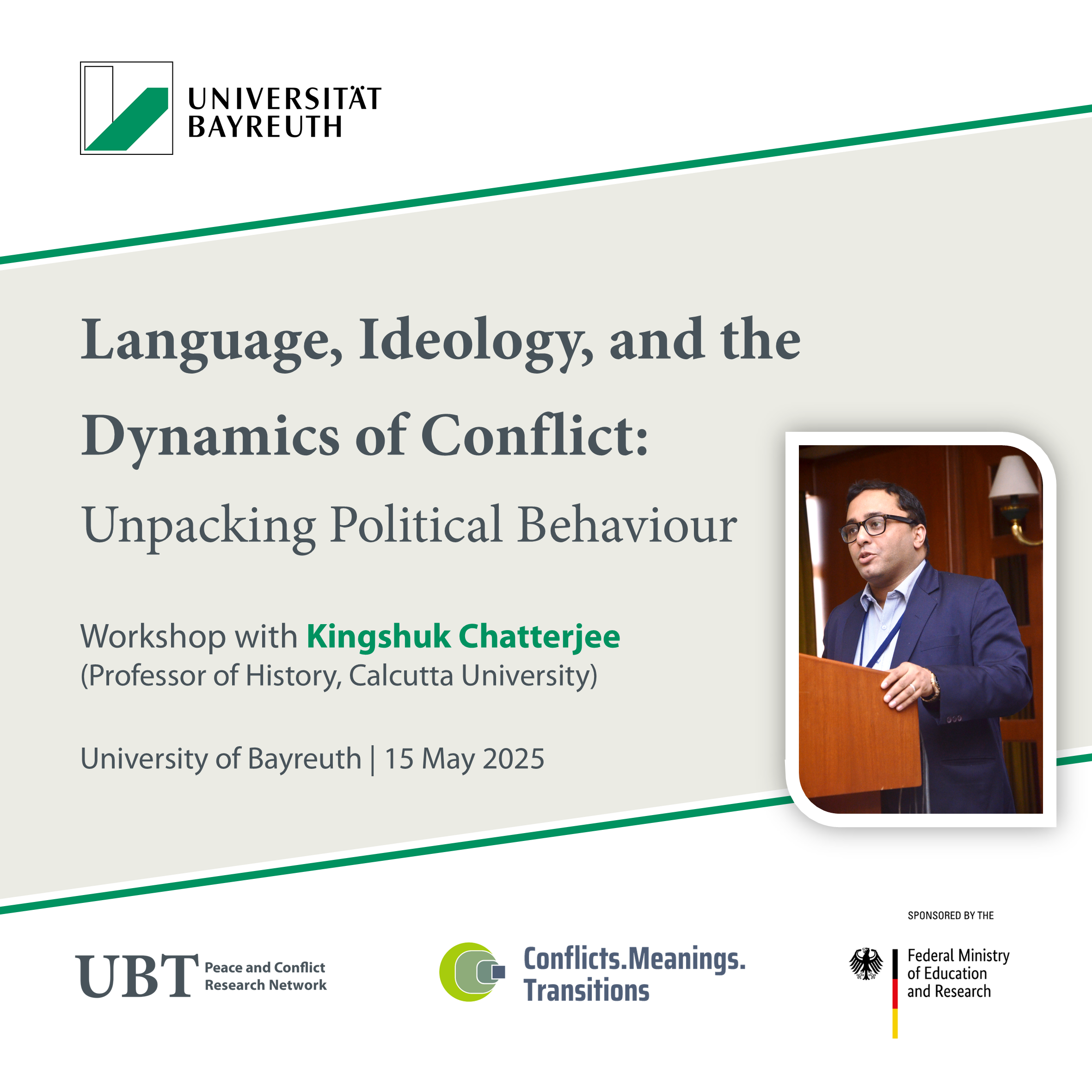News
Call – Workshop „Language, Ideology, and the Dynamics of Conflict“
15 May 2025 | Workshop at the University of Bayreuth with Kingshuk Chatterjee (Professor of History, Calcutta University)
Join us for a workshop that explores the ideological and ideational dimensions of politics, focusing on how language shapes political objectives and influences conflict. We will examine whether these ideological elements are consistent over time or driven by context, providing insights into the dynamics of social and military conflicts. Discover the critical role of language in understanding the roots of conflict and pathways to peace.
The study of politics often tends to be limited to social structures, institutions and ideologies – which implies that political behaviour is predictable, being determined by social structures (class, community, gender) and institutional frameworks. Ideological or ideational considerations are often understood to be providing the dynamic element in the study of politics, which is otherwise often considered to be hermetically sealed in formulation and autonomous in practice.
The assumption that ideas constitute perhaps the most important variable factor in politics has frequently played a crucial role in the understanding of conflicts, both in terms of causes and in terms of their nature. This often results in the impression that conflicts break out when protagonists subscribing to a particular view fight to defend or impose that view on others; the corollary to this impression is of course that peace obtains when different views are welded into an ideational consensus, or when a set of views obtain a kind of hegemonic status.
This workshop proposes to study the ideological and the ideational dimension of politics, particularly from the standpoint of conflict – both in the sense of social and/or inter-ethnic conflict and military conflict. The language in which political objectives and agenda are defined, expectations and apprehensions are framed, and success and failures are assessed, is crucial to the understanding of political behaviour that occasions conflicts – within territorial boundaries, and otherwise. The workshop will explore whether the ideological and the ideational elements in politics tend to be perennial in character (generating routine or similar demands across different times), or merely episodic and contextual (with formulations changing with contingent situations), driven more (or, as much) by material considerations.
How to participate?
This workshop invites PhD students and post-docs to present and discuss their research projects. It brings together Kingshuk Chatterjee (Professor of History, Calcutta University) with junior researchers working on diverse aspects of how language and ideology are related to conflict, foreign policy, war, security, and peace.
In a small group setting, the workshop intends to foster an informal discussion about research strategies, empirical puzzles, and theoretical challenges. It serves as a forum to discuss your research and academic issues that you consider relevant within these fields.
The workshop will take place from 9:00 until 13:00 with subsequent lunch at the Mensa. Depending on the number of participants, we may add an afternoon session until around 16:00.
The workshop is organized by the Conflicts.Meanings.Transitions network with support from the German Federal Ministry of Education and Research (BMBF)
Apply now!
During the workshop you can present some of your own work and receive feedback from the group and our special guest Prof. Chatterjee. If you have an outline, working paper, or draft chapter (15-20 pages) to share with the group, that’s very welcome (but not mandatory). You can also join as non-presenting participant, if you are simply interested in joining the discussion and contributing your insights.
If you are interested in participating, please get in touch with Jan Sändig (jan.saendig@uni-bayreuth.de) by 30 April. We will accept participants on a rolling basis (first-come-first-serve). If you wish to present your research, please add a brief abstract (1-2 pages) of your project. Unfortunately, we cannot cover any travel or accommodation costs.
We are looking forward to inspring conversations!

